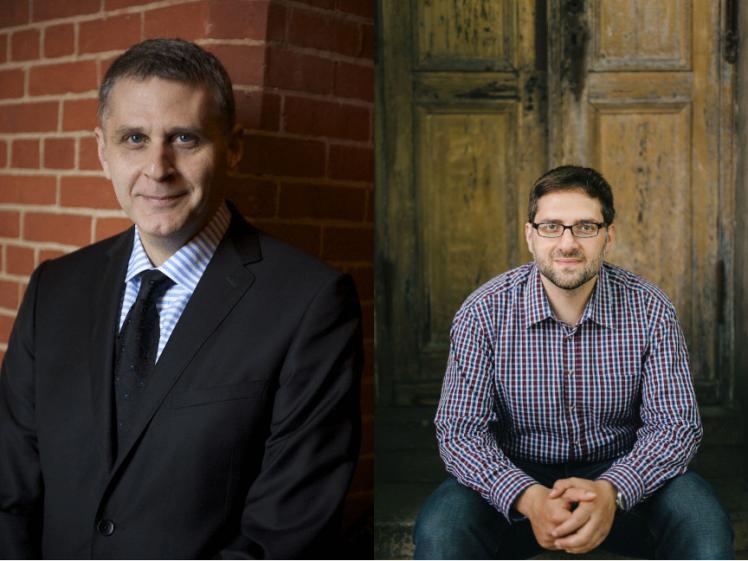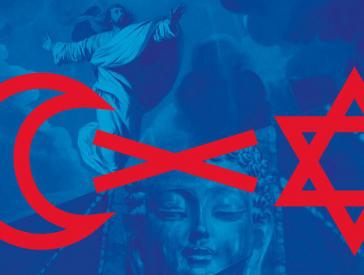Non-Transcendental Morality: Judaism, Islam, and Atheism
The Others’ Faith: World Religions through the Lens of Judaism and Islam (video recording available, in German and English)
The fourth event of our lecture series The Others’ Faith is dedicated to atheism and the question: Can mindsets critical of religion be constructive for a Jewish and Islamic theology that speaks to our times?
Skepticism, non-belief, and doubt have accompanied religions since their beginnings. As a result of advancing secularization, however, atheistic and agnostic convictions have become widespread in the Western world to an unprecedented level. How do Judaism and Islam respond to this?
recording available
Jacques Berlinerblau and Ufuk Topkara discuss, if mindsets critical of religion can be constructive for a Jewish and Islamic theology that speaks to our times. Event from 20 April 2020, in German and English; Jewish Museum 2020
As monotheistic religions, they both see the negation of God as a rejection of moral values. But do moral principles necessarily require recourse to transcendence? And how do Judaism and Islam meet the claim of rationality and reason formulated by the atheists?
A discussion with Jacques Berlinerblau (Georgetown University) and Ufuk Topkara (University of Virginia). Moderation Asher Mattern (University of Tübingen).
Jacques Berlinerblau
Jacques Berlinerblau is a Professor of Jewish Civilization and the Director of the Center for Jewish Civilization at der Georgetown University. He has published on a wide variety of scholarly subjects with special attention to heresy, atheism and secularism. He is the author of How to be Secular: A Call to Arms for Religious Freedom.
Abstract: How To Think About Jewish Atheism
The scholarly study of Jewish Atheism is still in its nascent stage and as such there is little in the way of peer-reviewed literature about this topic. This makes it challenging to confirm, or even investigate, a popular axiom which holds that Jews exhibit a unique affinity for godlessness.
The purposes of my discussion at the Jewish Museum are broad and programmatic. I will begin by surveying plausible and major “taproots,” or drivers, of Jewish atheism, assuming its presence is as pronounced as some believe. These, sometimes overlapping, taproots are: 1) a peculiar motif in Jewish Rabbinic speculation that permits for intense focus on what is colloquially known as Torah over and against concentration on the metaphysical God of Israel, 2) a rhetorical tendency within early Judaism for playful, verging-on-blasphemous, speculation about the divine, 3) a collective history of suffering, culminating in the Shoah, that elicits a uniquely Jewish “theodicy,” or explanation of suffering in light of God’s alleged beneficence, 4) the widespread embrace by 19th-century Eastern European Jews of Marxist-tinged worldviews which explicitly relegated the divine to the realm of “the superstructural,” “the chimerical,” etc., and, 5) a historical skepticism among a “pariah people” about official God narratives the likes of which were encountered in European Christendom.
Maybe as a cause and effect of the proceeding, Jews can find religious solace in, around, below, and even beyond God, all the while remaining Jews. Which is to say, many Jews can find validation as Jews in a sense of peoplehood, and/or a commitment to Zionism, and/or immersion in Jewish culture. That such a mode of religiosity is uniquely Jewish and uniquely bewildering to traditionalist Christians, Muslims, (and many orthodox Jews) is a key point to be made in this presentation. This paper ends with a plea for researchers and religious figures of all stripes to adopt a less doctrinaire and judgmental view of Jewish atheism and related positions. A willingness to understand the fluid, complex, historically conditioned and culturally creative nature of this form of Judaism is the ideological starting point for the study of Jewish Atheism.
Ufuk Topkara
Ufuk Topkara studied philosophy at Humboldt Universität zu Berlin and Harvard University. He has served as a lecturer in Islam at Evangelische Akademie Berlin and is the author of the book Umrisse einer zeitgemäßen philosophischen Theologie im Islam: Die Verfeinerung des Charakters (Outlines of a Contemporary Philosophical Theology in Islam: The Refinement of Character), which combines Islamic philosophy with existentialist philosophy.

Jaques Berlinerblau (left), photo: Rafael Suanes und Ufuk Topkara, photo: private
Lecture Series 2019/20: The Others’ Faith (6)



 X
X



